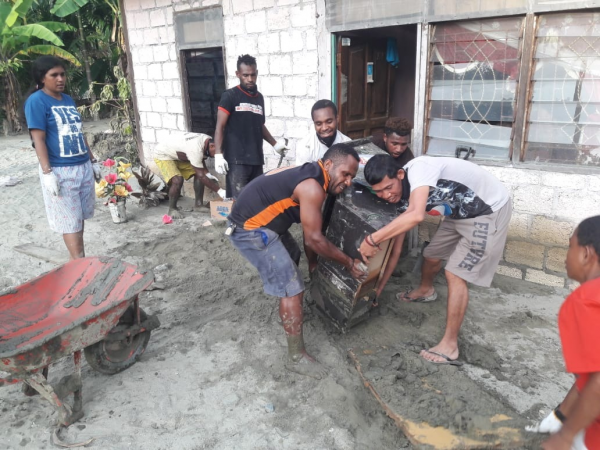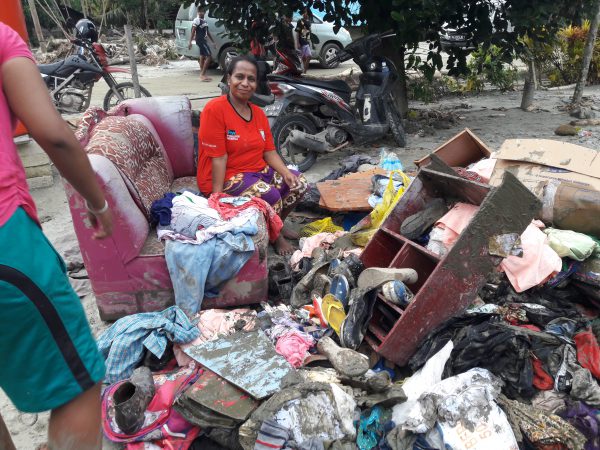Today’s post is based on a report written by Myrna Maxey.
Weeks of continuous rain in March 2019 caused deadly landslides and severe flash flooding in Sentani, a city in the Papua province of Indonesia. Waves of mud propelled boulders, trees, and debris throughout the city.
Over 100 people died, and 11,000 people are displaced.
Week One
After surveying the damage on the ground, Alliance international workers requested the help of CAMA staff Buzz and Myrna Maxey. On March 18, two days after the disaster, the Maxeys arrived and assessed the damage by helicopter.
Soon a rapid response team (RRT) formed, which included Maxeys, Alliance international workers, and local believers. The team began by distributing clean water, wheelbarrows, shovels, and crowbars in the worst-hit areas. The RRT also operated a shelter at a school for over 400 displaced men, women, and children.

Another task the team took on was to organize groups of Papuan youth to help dig out homes. They prioritized homes of widows or homes of families who had begun attempting to clean. The distribution and digging efforts always focused on building relationships and praying with hurting families.
Working with the local church, the Ebenhaezer Alliance Church became a shelter for displaced families. The RRT provided kitchen equipment and food while church volunteers cooked and served meals for displaced families. In the same way, two Indonesian Alliance young men were invited to join and assist the core team throughout the month-long relief effort. Through this process, they were trained in disaster response and in leading volunteer groups to help disaster victims.
Relief Work Continues
After a week of water and tool distribution, the team expanded their work to include a voucher program for victims who had lost homes and possessions. Money was deposited at a local store and vouchers were given to buy much-needed supplies.
One victim who received a voucher was a mother overwhelmed at the task of reclaiming her home and belongings. When she received the voucher her two young daughters ran up to her. “Mama, does this mean we can buy a mattress?” one asked. “And a blanket?” the sister added. The family was given hope.

Another core focus for the team was trauma counseling. Coloring and origami supplies engaged children while parents searched for loved ones or tried to reclaim possessions.
One team member experienced the tragedy of seeing a father find the body of his 8-year-old child. The team was able to bring the comfort of Jesus to this grieving family. They also invited the children, including those of the extended family, to participate in trauma counseling.
Services Provided
Each morning at 8:00 a.m. the RRT would gather for devotions, prayer, and assigned roles and activities. They began the day asking God to show them the person or family that He wanted them to help that day.
In God’s strength and wisdom, the team served:
– 17 children who were without water at an orphanage. They received relief when a 4WD pickup, with a water tank strapped on, arrived in their inaccessible area.
– 12 widows and 20 families who received vouchers for much-needed supplies.
– 19 families whose homes were cleaned out by Papuan youth. The youth also distributed 200 shovels, 15 wheelbarrows, 150 water-filled jerry cans, and 15 stoves.
– Shelters housing the displaced received several truckloads of supplies.
– Several neighborhoods were cleaned up by having excavators, provided by a local businessman, remove approximately 110 truckloads of sand and mud.
– Five hard-hit neighborhoods had water tanks set up and received 70,000 liters of water.
“May these physical expressions of His love have a long-term impact on those who are helped,” Myrna Maxey said.
Thank you for your gifts and prayers that continue this work.